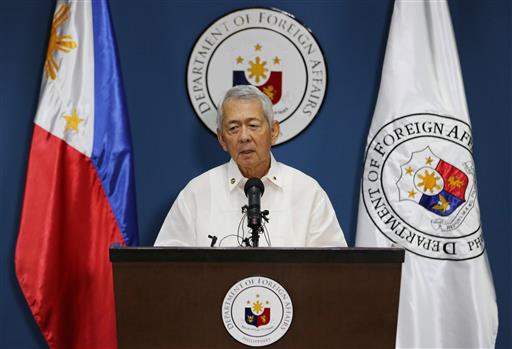China will be the loser–Yasay
UNLESS it acknowledges the ruling of the arbitral tribunal against its territorial claims in the West Philippine Sea, China will emerge as the “loser” in its sea dispute with the Philippines, Foreign Secretary Perfecto Yasay told lawmakers on Tuesday.
“We are trying to make China understand especially when the dust settles that unless they respect and recognize the arbitral tribunal, they will be the losers at the end of that day on this matter,” he told a budget hearing of the Department of Foreign Affairs (DFA) at the House of Representatives.
Yasay said any bilateral talks with China on disputed territories in the West Philippine Sea would have to be done within the context of the ruling of the UN Permanent Court of Arbitration favoring the Philippines’ claims.
He said the Philippines would not engage China “if they will impose as a condition that we will only have bilateral talks outside the framework of the arbitral tribunal’s decision.”
An arbitration court in The Hague ruled in July that China had no historical title over the South China Sea and it had breached the Philippines’ sovereign rights. China, however, ignored the ruling.
Yasay made it clear, however, that the Philippines would only take peaceful and diplomatic actions. “We will not be engaging China in any shooting war in this instance. We will exercise maximum tolerance,” he said.
Prior to starting bilateral talks, the Philippines plans to seal a deal for China to allow Filipino fishermen to access their traditional fishing grounds in the West Philippine Sea, Yasay said.
Yasay said such an arrangement was needed to ensure the safety of Filipino fishermen in the disputed waters.
China seized Scarborough Shoal in 2012, denying Filipino fishermen access, one of the factors that prompted the Philippines to seek arbitration.
Yasay said the Philippines would also respect the traditional fishing grounds of the Chinese and the Vietnamese fishermen in the same waters.
Permanent solution
“This is what we would like to make sure that China would be able to agree upon on a provisional basis, until we can come up with a permanent solution to this issue,” he said.
Vietnamese President Tran Dai Quang warned on Tuesday that there would be no winners in any armed conflict sparked by territorial disputes in the South China Sea.
Quang, who is on a state visit to Singapore, told a forum that recent developments there were threatening regional security.
The Vietnamese leader did not mention any country but there is growing unease over China’s actions.
China claims most of the South China Sea. It has reclaimed reefs and built airstrips capable of hosting military equipment, sparking anger from competing claimants led by Vietnam and the Philippines.
“The South China Sea, located at the heart of Southeast Asia, not only brings about many important benefits to nations in the region but it is also a vital route to maritime and air transport of the world,” Quang said.
But “recent worrying developments” there “have had a negative impact on the security environment of the region, especially maritime security and safety, freedom of navigation and overflight.
“And should we allow instability to take place, especially in the case of armed conflicts, there will be neither winners or losers but rather all will lose,” he warned.
Vietnam has been among the most vocal critics of China’s blanket territorial claims. In 2014 China moved a controversial oil rig into contested territory, prompting riots in Vietnam.
China’s activities in the sea have also drawn criticism from the United States, which says it seeks to ensure freedom of navigation in the waterway through which $5 trillion in annual global trade passes.
The sea row has also driven a wedge between members of the Association of Southeast Asian Nations (Asean), which has failed to forge a unified front against Beijing’s actions.
Asean members Brunei, Malaysia, the Philippines and Vietnam as well as Taiwan have competing claims in the South China Sea. With reports from the wires
For comprehensive coverage, in-depth analysis, visit our special page for West Philippine Sea updates. Stay informed with articles, videos, and expert opinions.
